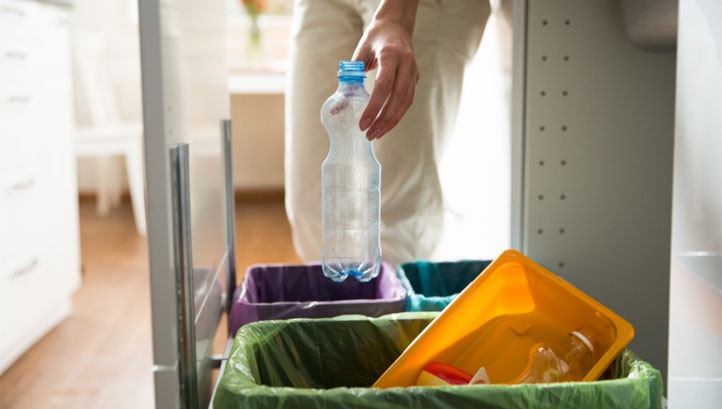Recycling gap: Most Brits claim they recycle plastic at home, so why aren't rates improving?
A new survey of 5,000 adults has revealed that eight in ten UK adults recycle at least three-quarters of the plastics waste produced in their homes. So why is the UK's domestic plastics recycling rate stagnating?

Plastic recycling is rising up the environmental agenda in the UK again, with the end of lockdown on the horizon
The statistic is a headline finding of the new ‘State of Plastic Recycling’ report from Hi-Cone, which manufactures packaging solutions including the ring carriers found on multipacks of beverage cans.
In producing the report, Hi-Cone commissioned YouGov to survey 5,000 adults across the UK, Spain, Mexico and the US, with an even split of respondents from each nation. Of the UK respondents, 79% claimed to recycle at least 75% of the plastic waste generated within their homes, largely through kerbside recycling systems.
This proportion is considerably higher than the official figures from the Department for Food, the Environment and Rural Affairs (Defra). Figures from Defra last March revealed that the UK reused or recycled 46.2% of the plastic packaging it produced in 2017. New Defra figures on dry mixed recycling from homes, including plastics, published this month, revealed a minimal increase since then.
It could be the case that respondents were either over-estimating or deliberately exaggerating the proportion of plastic they place into recycling bins knowing that it is recyclable. Hi-Cone notably recorded a mixed picture in terms of awareness on the recyclability of certain items and in terms of understanding key buzzwords like “circular economy”.
However, issues with collection and processing – in terms of infrastructure capacity and capability – probably also have a role to play. On the former, Hi-Cone’s survey found that one-third of respondents wanted more home recycling for plastics, like more bins or more frequent collections.
On the latter, many councils have been observed to either incinerate collected recycling or export it abroad due to a lack of processing capability locally. This has contributed to distrust from residents which may have affected recycling behaviours – one 2019 survey found that four in ten UK adults suspect that their council’s contracted waste manager is not recycling the majority of the items they separate. And, while innovative systems are coming online rapidly, the UK still does not have large-scale facilities capable of recycling things like black plastics or plastic films in a closed-loop fashion.
The British Plastics Federation estimates that the UK’s recycling capacity now is just one-third of what it will be in 2030. Updates on the UK’s Resources and Waste Strategy, due this year after pandemic-related delays, may well provide good news in this space.
You can read a fuller breakdown of the Defra figures in edie’s recent ‘Tracking the UK’s waste mountain in charts’ feature.
Out and about
As well as challenges and opportunities with recycling domestically, the Hi-Cone report tracked consumer attitudes about the ease of recycling on-the-go.
This had been a key focus of many collaborative projects involving corporates pre-Covid-19, including Hubbub’s 'Leeds By Example’, which has since been replicated in cities including Swansea and Edinburgh. Over lockdown, many schemes of this nature were either paused or experienced lower levels of uptake from consumers. Separately, the reduction in the frequency of waste collections from public bins by many councils has been linked to a rise in littering and a decrease in recycling on-the-go in the UK.
With the end of lockdown restrictions on the horizon, the Hi-Cone survey found a strong public appetite for tools to help them recycle on-the-go. 62% of respondents from the UK said they want to see more recycling bins in public places.
Who’s responsible?
Another major question posed in the Hi-Cone survey focussed on who consumers believe is responsible for plastic waste.
Almost three-quarters (64%) said that product manufacturers and other plastic producers, like companies that make the raw materials or that manufacture the packaging elsewhere, should bear the most responsibility for ensuring recycling. Figures were lower for the national government (57%) and lower again for devolved administrations and local councils.
Only one in ten people said that non-profit groups should assume the responsibility. Half stated that consumers have a responsibility, but most agreed that other actors across the value chain also have a role to play.
These changes in opinion are being mirrored in the proposed changes to policy under the Resources and Waste Strategy. The strategy outlines plans to alter Extended Producer Responsibility (EPR) schemes and to introduce taxes on plastics packaging with low quantities of recycled content and/or poor recyclability.
The Strategy also floats a deposit return scheme for plastic drinks containers – likely to come into effect in 2023 at the earliest. Such a scheme would incentivise consumers with the promise of a refundable deposit, while placing new responsibilities on corporates.
Beyond the Strategy, the UK Government has committed to eliminating all “avoidable” plastics waste by 2042.
No comments:
Post a Comment